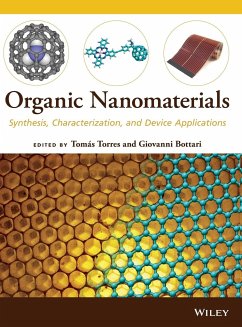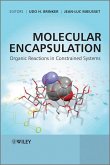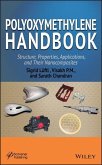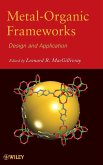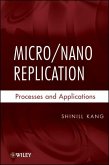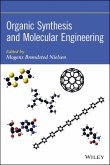This book offers comprehensive and up-to-date coverage of functional organic nanomaterials. Chapters present the views of leading experts on how organic nanomaterials can be synthesized and prepared, analyzed and characterized, studied, organized at the nanoscale, and incorporated into devices for real-world applications. Due to the interdisciplinary nature of organic nanomaterials, the book appeals to those involved in chemistry, physics, materials science, polymer science, and (chemical and material) engineering. Topics include conducting hybrid materials, biomaterials, carbon nanotubes, photovoltaics, dye-sensitized solar cells (DSCs), lithographic techniques, bioassays, sensors, and nanomedicine.
Discover a new generation of organic nanomaterials and their applications Recent developments in nanoscience and nanotechnology have given rise to a new generation of functional organic nanomaterials with controlled morphology and well-defined properties, which enable a broad range of useful applications. This book explores some of the most important of these organic nanomaterials, describing how they are synthesized and characterized. Moreover, the book explains how researchers have incorporated organic nanomaterials into devices for real-world applications. Featuring contributions from an international team of leading nanoscientists, Organic Nanomaterials is divided into five parts: * Part One introduces the fundamentals of nanomaterials and self-assembled nanostructures * Part Two examines carbon nanostructures-from fullerenes to carbon nanotubes to graphene-reporting on properties, theoretical studies, and applications * Part Three investigates key aspects of some inorganic materials, self-assembled monolayers, organic field effect transistors, and molecular self-assembly at solid surfaces * Part Four explores topics that involve both biological aspects and nanomaterials such as biofunctionalized surfaces * Part Five offers detailed examples of how organic nanomaterials enhance sensors and molecular photovoltaics Most of the chapters end with a summary highlighting the key points. References at the end of each chapter guide readers to the growing body of original research reports and reviews in the field. Reflecting the interdisciplinary nature of organic nanomaterials, this book is recommended for researchers in chemistry, physics, materials science, polymer science, and chemical and materials engineering. All readers will learn the principles of synthesizing and characterizing new organic nanomaterials in order to support a broad range of exciting new applications.
Hinweis: Dieser Artikel kann nur an eine deutsche Lieferadresse ausgeliefert werden.
Discover a new generation of organic nanomaterials and their applications Recent developments in nanoscience and nanotechnology have given rise to a new generation of functional organic nanomaterials with controlled morphology and well-defined properties, which enable a broad range of useful applications. This book explores some of the most important of these organic nanomaterials, describing how they are synthesized and characterized. Moreover, the book explains how researchers have incorporated organic nanomaterials into devices for real-world applications. Featuring contributions from an international team of leading nanoscientists, Organic Nanomaterials is divided into five parts: * Part One introduces the fundamentals of nanomaterials and self-assembled nanostructures * Part Two examines carbon nanostructures-from fullerenes to carbon nanotubes to graphene-reporting on properties, theoretical studies, and applications * Part Three investigates key aspects of some inorganic materials, self-assembled monolayers, organic field effect transistors, and molecular self-assembly at solid surfaces * Part Four explores topics that involve both biological aspects and nanomaterials such as biofunctionalized surfaces * Part Five offers detailed examples of how organic nanomaterials enhance sensors and molecular photovoltaics Most of the chapters end with a summary highlighting the key points. References at the end of each chapter guide readers to the growing body of original research reports and reviews in the field. Reflecting the interdisciplinary nature of organic nanomaterials, this book is recommended for researchers in chemistry, physics, materials science, polymer science, and chemical and materials engineering. All readers will learn the principles of synthesizing and characterizing new organic nanomaterials in order to support a broad range of exciting new applications.
Hinweis: Dieser Artikel kann nur an eine deutsche Lieferadresse ausgeliefert werden.

